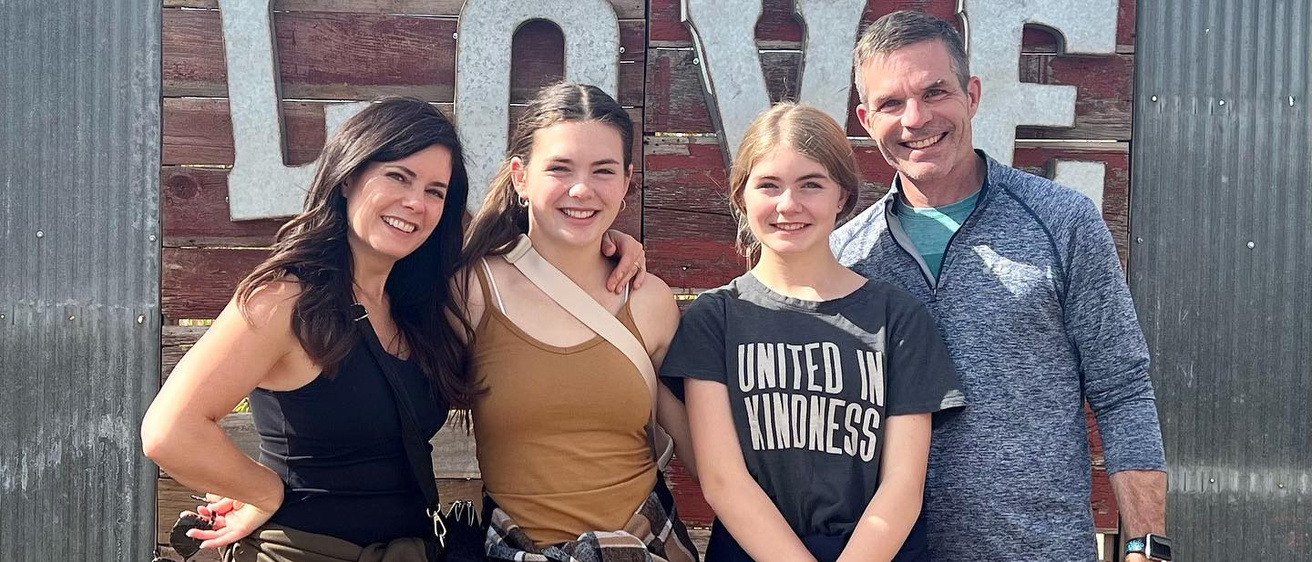Medicine alumna Amy Shriver uses her role as a pediatrician to help families learn how focusing on social connection, family reading time, and more can contribute to kids’ mental and physical health.
Story: Celine Robins
Photography: courtesy of Amy Shriver
Published: April 21, 2025
The top photo...
Amy Shriver — seen here with her daughters Abby Welch and Emma Welch and her husband, Andrew Welch — practices in Des Moines, Iowa. She felt motivated to live in the Hawkeye State in order to “make sure my children had the best chance for the safest, happiest, healthiest life and to be around people who love them.”
Schoolwork. Extracurricular activities. Screen time. The ups and downs of middle school friendships.
There are lots of factors that influence kids’ well-being in addition to their physical health, and sometimes it can be tough to know which choices will be “right” for a child’s development.
Fortunately, pediatricians like Amy Shriver can help.
“Parents are anxious to do everything they can to help their child be safe,” she says. “I enjoy being there for my parents as an authority who has training, expertise, and comfort to offer them.”
Shriver, a 2004 graduate of the University of Iowa Carver College of Medicine, is a general pediatrician at Blank Children’s Pediatric Clinic in Des Moines, Iowa. She comes from a long line of Hawkeyes, but as the first physician in her family, it took her a little time to realize that medicine was her calling.
“I was really interested in people and relationships,” Shriver says, “and I think the way our brains work is really fascinating. That’s where I started with my interest in science; I was focused on psychology as a career early on.”
She left Iowa for part of her education and early career, but when she ultimately decided to attend medical school, coming home was a top priority.
“I was born in Iowa and grew up in Iowa. My family is here,” Shriver says. “My motivation to come back was about making sure my children had the best chance for the safest, happiest, healthiest life and to be around people who love them.”
Shriver also realized that Iowa needed people like her — passionate, caring individuals who are committed to serving in the state.
“Iowa needs advocates,” she says. “For our children, Iowa needs people who are well-trained in what’s happening with children in Iowa. It takes a broader perspective to see how when we strengthen each other, we strengthen our communities.”
“When you take the time to put down everything else and say to your child, ‘I’m going to be with you right now, and we’re going to go on this beautiful, funny, cute journey together,’ over time, that communicates to the child, ‘I am worth loving.’ It creates a confident, resilient person that grows into an adult that does good in the world.”
The ABCs of childhood development
The pediatric focus closest to Shriver’s heart is promoting shared reading in early childhood.
“When we read with children, we help them see who they are and where they come from — right in the context of their families and communities,” she says. “Books can be like mirrors that reflect their own lives, windows that show them how others live, and sliding glass doors that invite them into new worlds and ideas. Sharing stories together isn’t just about learning to read. It’s about helping kids grow into who they’re meant to be.”
Shriver has served for 14 years as medical director of the Midwest chapter of Reach Out and Read, a national organization that partners with pediatricians to promote shared reading as an important driver of childhood brain development and parent-child bonding. The organization also provides funding to provide free books to children during well visits to their doctor.
“The fact that this happens with your pediatrician, along with the guidance of how to keep your child safe and healthy, is integral to the parents’ understanding that this book is like medicine for their child’s brain,” Shriver says. “It is essential for the optimal well-being of your child to have those moments with you.”
Shared reading, she says, leads to greater vocabulary and literacy skills in early education. It also builds children’s self-confidence and sense of belonging.
“When you take the time to put down everything else and say to your child, ‘I’m going to be with you right now, and we’re going to go on this beautiful, funny, cute journey together,’ over time, that communicates to the child, ‘I am worth loving.’ It creates a confident, resilient person that grows into an adult that does good in the world,” Shriver says.
‘Two eyes for seeing and two arms for holding’
Shriver also is passionate about incorporating mental health into her practice as a general pediatrician. She was part of Iowa’s Children’s Mental Health and Well-Being Workgroup from 2015 to 2018 and has served as the American Academy of Pediatrics’ co-chair for children’s mental health in the state since 2018.
“The pandemic was eye-opening to all of us pediatricians as to how relationships affect our well-being,” she says. “We saw a dramatic shift to poor mental health for kids who missed out on school because it is so critical to their well-being to have friends. Before the pandemic, I knew that intellectually; but during COVID, we saw it walking into our clinics every day. We felt it. And it shocked me so much that it made me change the way I practiced.”
Now, when she has visits with patients in their middle school years and early teens, she makes it a point to check in with them about three important factors: emotional safety at home, friendships with peers, and extracurricular activities that give them a sense of belonging.

Medicine at Iowa
The Roy J. and Lucille A. Carver College of Medicine is a highly ranked medical school where students learn to become accomplished clinicians and top-flight researchers and educators. Students come to Iowa to study medicine in a program that uses case-based learning as the basis of their education.
“Those are the key three things that kids need to make it through early adolescence,” Shriver says. “That’s what I screen for now. And if you don’t have those things, how can we help you connect with them?”
She also teaches families the importance of preparing to deal with stress with a mnemonic she developed, CC 123:
- The first C stands for connection. “Relationships matter,” she says. “When you’re at your worst, relationships are what you need the most.”
- The second C stands for coping skills. “Everybody is going to have a hard time with life sometimes. So, don’t be surprised; be prepared with your coping strategies,” she says. She also suggests that routines and familial rituals can be helpful coping skills for kids to manage stress — and that reading together is an especially powerful family ritual to build.
- The 1 reminds caregivers to take one moment to stop and think when their child misbehaves. “Every behavior is a communication for children,” Shriver says. “They’re telling you something, and it’s your job as a parent to figure out what and how to respond.”
- The 2 stands in for our two eyes and two arms. “Every human being likes to feel that someone is attuned to them,” she says. “Physical affection matters for so many kids.”
- The 3 is a challenge to find three ways every day to show your child you love them. “You can do things to help your child understand how much you love them, through words, touch, and the time you spend,” she says. “Connect with your child and let them know every day.”
‘I love not being the smartest person in the room’
Shriver loves the constant challenge that being a physician in Iowa provides.
“There are so many reasons why I’m glad I’m a doctor. I love people, I love relationships, and I love not being the smartest person in the room,” she says. “Being in a career where you surround yourself with bright, interested people that share your same focus and drive to do better for their patients, you’ll always be learning.”
She takes great pride in being able to pass the torch to a new generation of providers through her roles as an assistant professor of specialty medicine at Des Moines University and as president of the Iowa chapter of the American Academy of Pediatrics.
“My main goal right now as president is to facilitate the needs of my membership,” she says. “Do you need recognition for your work? Do you need motivation to become the president next, because of your awesome skills? Do you need a position right now where you get to do passionate work because we’re living in tough times, so will it make you feel empowered to do this work? Making sure everyone’s voice is heard and contributions are recognized is what a leader does.”
